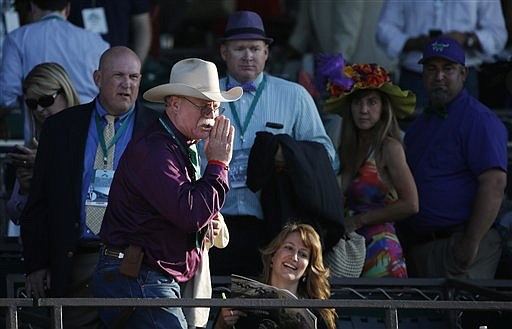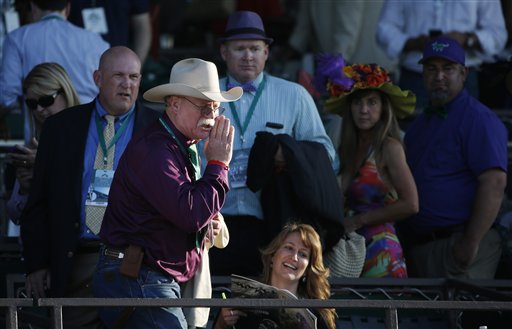Nobody likes a sore loser. Especially when he drags handicapped children into his arguments.
So it is more than a little tempting to completely dismiss California Chrome co-owner Steve Coburn's angry rant about "cheaters" taking a "coward's way out" to knock off Chrome in this past Saturday's Belmont Stakes and deny him horse racing's first Triple Crown winner in 36.
Especially when he chose the rather tasteless analogy of "That would be like me, at 6-2, playing basketball with a kid in a wheelchair ... would that be fair?," to compare his horse's challenge of going against Belmont winner Tonalist and runner-up Commissioner, both of which ran in the Belmont after skipping the earlier Triple Crown races -- The Kentucky Derby and the Preakness.
(As a side note, I've covered both wheelchair basketball and tennis in my time and I've seen athletes in both sports who could probably embarrass the 61-year-old Coburn. But that's another column for another time.)
Truth is, this may be one of those don't-shoot-the-messenger-just-because-you-don't-like-the-message moments in American sports. Because love him or loathe him, Coburn makes an interesting argument.
It may ultimately not make a handful of horse feed's difference. But the notion of forcing horses to run at least one of the first two Triple Crown races to earn a start in the third is almost certain to create some meaningful and important debate in the horse racing community between now and next spring.
At least it should. You can't wait until the Final Four to begin playing in the NCAA basketball tournament. You can't wait until the Super Bowl or the World Series enter the playoffs in professional football and baseball. You can't skip the early rounds of the World Cup and still emerge as the world's champ.
The difference, of course, as any horseman would swiftly tell you, is that the Final Four and Super Bowl don't stand alone. They are merely the final rounds of a tournament. However, the Kentucky Derby, Preakness and Belmont -- the three legs of thoroughbred horse racing's Triple Crown -- aren't technically connected, even if they sometimes seem that way on years a horse such as California Chrome wins the Crown's first two legs.
Nevertheless, they are meant to represent singular successes and great achievements, as different as the pro golf grand slam that is the Masters, U.S. Open, British Open and PGA Championship. Or its tennis equivalent -- the Australian Open, French Open, Wimbledon and U.S. Open.
You must win all four to complete the single-season Grand Slam, but you don't have to win the Masters, for instance, to enter the British Open.
Beyond that, we didn't even call it the Triple Crown in this country when Sir Barton became the first horse to win all three in 1919. According to a Churchill Downs press release, a sports writer used the phrase for the first time after Gallant Fox became the second American horse to accomplish the feat in 1930.
But any modern horseman would have a hard time arguing with reason that the accepted parameters of the industry haven't changed in the 36 years since Affirmed became the last Triple Crown winner in 1978.
For proof, merely consider that Alydar strongly challenged Affirmed in all three races, finishing a close second each time. Sham similarly took on Secretariat for all three in 1973, though Big Red made Sham resemble his name in the Belmont, winning by 31 lengths.
"It's not fair to these horses who have been in the game from Day 1," Coburn claimed, pointing to the wear and tear on Chrome as opposed to the three horses that finished ahead of him in the Belmont -- he tied for fourth with Wicked Strong.
The winner and runner-up were both running in their first Triple Crown race of the year and third-place Medal Count was racing for the first time since finishing eighth in the Derby, a span of five weeks.
So, yes, there would appear to be some cherry-picking going on. But given the Belmont's 1.5 mile length, is pointing a horse bred for distance -- as Commissioner is -- toward the Belmont any different than all those clay-court specialists -- Albert Costa and Gaston Gaudio, to name but two -- who have won the French Open and no other major?
Even the great Rafael Nadal -- winner of nine French Opens after Sunday's victory over Novak Djokovic -- has won nine of his 14 Slams on one surface. Does that lessen his achievement? Is it unfair to Djokovic, Andy Murray and Roger Federer that the vast, vast majority of his total wins have come on clay?
Nadal certainly plays all the majors when healthy, so he's hardly ducking anyone. But he probably also wouldn't be mentioned in the same breath as Federer, Pete Sampras and Rod Laver if it weren't for clay.
But he is mentioned. And in glowing terms. Whether fair or not, maybe that's the rationale of thoroughbred racing. To be considered the best you need to be capable of beating the best at their best length.
If Chrome had won on Saturday he would have been considered one of the greatest horses ever, one of only 12 3-year-olds to win the Triple Crown. Instead, because he lost, and quite possibly as much because of a hoof injury early in the race due a collision as because of a well-rested field -- "like having a finger nail pulled out," was Chrome trainer Art Sherman's description of the discomfort level the horse may have felt -- Chrome's co-owner looks like the worst loser in the history of sports.
"I'm 61 years old and I'll never see in my lifetime another Triple Crown winner because of the way they do this," Coburn said. "You know, if you've got a horse, run him in all three."
It's not a bad idea. It's just probably never going to happen. But before everyone gives up on seeing another Triple Crown winner, consider this: Secretariat won the Belmont in what remains a record time of 2:24. Affirmed won his in 2:26.8. Tonalist's winning time on Saturday was 2:28.52.
So maybe it's not all the system. Maybe it's that horses seem to be the one athlete not getting bigger, stronger, faster in the 21st century. When that changes, if it changes, so might our odds of witnessing another Triple Crown winner in our lifetimes.
Contact Mark Wiedmer at mwiedmer@timesfreepress.com

